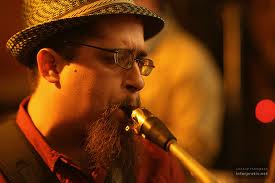Rex Gregory is an extremely talented, but also very disciplined, instrumentalist. He plays with a wide variety of people around town in a number of styles, many of them not fixed genres. Part of this comes from a great talent for getting with the "conversational" style that emerges when groups of players get together to improvise. Basically, he's quick! He's also young (27.) He plays flute, all the saxes, and clarinet and last year he released his first album as a leader, An End To Oblivion. He is very comfortable dealing with ideas both "intellectual" and in music. He enthusiastically tackles areas where he has no understanding and he is quite well read as a result. If you check his blog at http://rexgregory.blogspot.com/ you can see he writes confidently too whether you are in agreement with his opinions or not. I felt this was an entertaining interview because Rex is comfortable with shooting off opinions. His website is at http://rexgregory.com/ The last section of this interview got into some very interesting areas that show a lot of the inner symbolic possibilities that are available in the basic elements of music.
This is the most conversational interview to date.
This conversation happened outdoors so there is some wind noise. On the other hand it seems comfortable and you get the sounds of the Marigny on a pleasant late spring day.
Part 1- Rex talks about getting back to jazz and what he means by jazz, jazz competitions and whether there is a place for competition in music, Beethoven and Viennese classical music.
Part 2- how Rex started on saxophone, background in Texas and music in his family, university selection, what was serendipitous about University of New Orleans instead of New York, herd mentality in New York, tribalism, influence of the previous generation of jazz musicians from Texas, Robert Glasper, Claudia Quintet, studies with Ed Petersen, studies with Brice Winston
Parts 3 and 4 have very interesting philosophical information in them. Rex describes more closely, especially in part 4, the relationship between his ideas and the way they actually shape his compositions.
Part 3- The word "Jazz", Duke Ellington, genres, blending in, the state of modern jazz in New Orleans, his record An End to Oblivion, influence of All the rest is noise by Alex Ross, 20th century nihilism(?), why we are in a retrospective age and the retrospective mind frame, the impact of mass communication.
Part 4- Rex really gets down to business here; what he means, what his process was in his writing for the album, and what the connection is between his thoughts and the actual construction of the pieces of music. A very interesting section occurs here where he breaks down the meaning of a number of gestures in one of his pieces of music. He also discusses whether and how he is communicating his ideas with audiences and where he is going now. Rex revealed something generously here and despite the depth, this segment has a nice blend of seriousness with humor.



